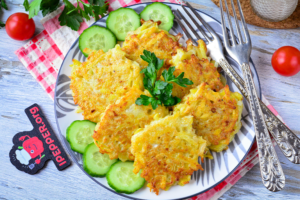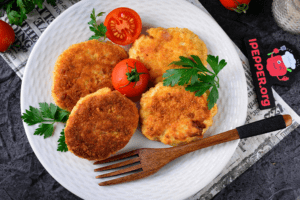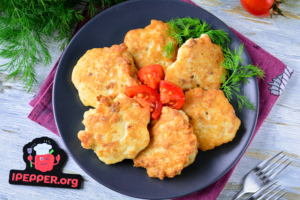Egg chicken
Now it’s hard to imagine cooking without 🥚eggs🥚, but once an omelette was a festive breakfast on the table of the poor. Despite the fact that the eggs of all domesticated birds are suitable for food, it is chicken that occupies the leading place in terms of frequency of consumption. Their main suppliers to the market shelves remain poultry farms, but many people prefer an agricultural product brought straight from the village. Remaining the subject of discussion among doctors, eggs are firmly entrenched in the daily diet, supplying the body with essential amino acids. Is the product as dangerous as they say about it from TV screens?
Сalories
157 calProteins
12.70 grFats
10.90 grCarbohydrates
0.70 grNutritional value per 100 g. Calories calculated for raw foods.
Glycemic index
48Common allergen
yesMake sure that you do not have an individual intolerance to this product.
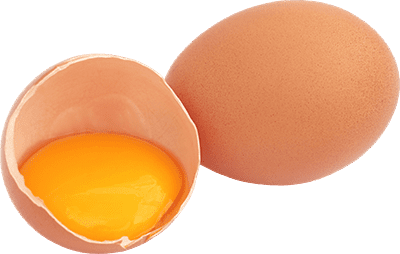
The history of the egg chicken
Presumably, the first chickens were domesticated more than two thousand years ago in hot India. It was from that moment that the era of eggs began, which still remain a valuable food product. A hundred years later, chickens came to Greece and Egypt, where the peasants got the product from wild quails. On the walls of the Egyptian tomb of Haremhab, a drawing is carved depicting a man holding a basket with large ostrich eggs. Judging by this picture, the ancient Egyptians treated with respect a product that was rare for them. A similar attitude can be traced among the Romans, who began their day with the use of egg dishes. The shell was not left without attention, but was kept in dishes, protecting the house from evil spirits.

Large-scale production begins only in the 17th century in European countries, where more than a hundred breeds of laying hens were born. Russia only a century later will receive the first breed of domestic chicken. Up to this point, birds from peasant farms were spawning irregularly, producing a very small egg. To cook scrambled eggs for one person, it was necessary to break more than a dozen such eggs.
The benefits and harms of egg chicken
The question of the benefits and harms of a chicken egg still leaves a lot of doubt. To decide on the advisability of using a product, it is worth learning more about its benefits and possible harm. With dozens of studies, doctors managed to talk about it from different angles, where important aspects of health are affected.
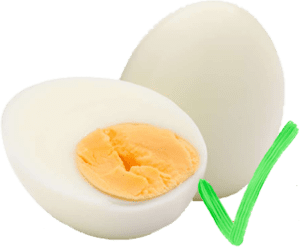
✅ Reducing the risk of developing cardiovascular diseases – according to Chinese scientists, one egg per day will not leave any negative consequences for health. For a long time, the yolk was skeptical, as it was considered a source of “bad” cholesterol. Such an opinion has a right to exist, but now experts are sure that people who consume no more than five or six pieces weekly are more protected from heart and vascular diseases. In the group of subjects, the risk of developing a stroke decreased by 26%, and heart and vascular diseases by 18%.
✅ Prevention of diabetes mellitus – using molecular diagnostic methods, Finnish researchers have established a positive effect of egg fats on carbohydrate metabolism. The experiment involved healthy middle-aged men who consumed one egg daily. As a result, the likelihood of developing type 2 diabetes mellitus decreased by 13% in the subjects, and the risk of complications of this disease in people with a previously established diagnosis fell to 11%.
✅ A source of protein for muscles – for a reason, athletes in the fight for muscle mass prefer eggs, because just one contains about 7 g of pure protein. A complete protein contains all the essential amino acids that any body needs. Among people who follow the figure, it is widely believed that the yolk is useless, since it contains nothing but fat. It turned out that the composition of the yolk contains components that enhance the incorporation of protein into muscle tissue. Therefore, after strength training and hard work, it is better to eat the product completely for faster recovery.
✅ Hypertension Prevention – a long-term study in Canada on the effect of egg white on blood vessels showed interesting results. Eaten protein, after contact with gastric and intestinal enzymes, turns into substances that act like ACE inhibitors – a group of drugs with antihypertensive action. Moreover, this effect was more pronounced with the use of scrambled eggs.
✅ Prevention of melanoma – phosphitin, obtained from the yolk, is able to inhibit the enzyme tyrosinase, which triggers the synthesis of melanin. In turn, an excess of melanin in the cells is characteristic of a malignant tumor – melanoma. By adding phosphitin to the therapy of oncological patients, doctors managed to reduce the activity of tyrosinase to 40%, and melanin – to 17% compared with another experimental group, where such manipulations were not carried out. This research could pave the way for new anticancer drugs.
If the benefit of the product has become a little clearer, then what can be said about the harm? This question is difficult to answer even for doctors, who are constantly arguing about its effects on health. Nevertheless, in the main points discussed, they managed to come to some conclusions, united in a small list.
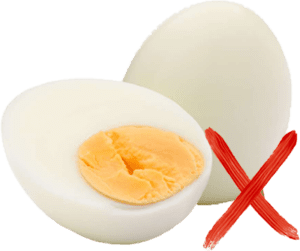
❌ A common allergen – children under 5-6 months of age are especially sensitive to egg white, so this product is contraindicated for babies. By the age of 4-5, allergic reactions become less acute or completely disappear, and in adulthood, allergies practically do not occur. In severe cases, it is necessary to refuse in the diet not only the protein of chicken eggs, but also other birds in order to prevent cross-reactions.
❌ Progression of diseases of the digestive system – a “heavy” yolk, rich in cholesterol, is difficult to digest in large quantities by the digestive organs. A big blow falls on the liver, pancreas and gallbladder. People with diseases of these organs should limit the number of products in their menu, and scrambled eggs and scrambled eggs become completely contraindicated.
❌ The risk of salmonellosis – lovers of the raw product and people who neglect to wash eggs before breaking them into the pan are susceptible to the development of intestinal infections. A fully cooked egg does not contain any microbes with itself, as they remain on the shell along with litter particles. Washing before cooking helps reduce the chance of salmonellosis almost completely. The exception is slightly runny yolk, which may still contain some salmonella that has penetrated through the damaged shell.
Although there is not so much harm from the product, it is better to make a choice about the advisability of its use together with a doctor.
What does a egg chicken taste like
The taste of an egg is largely influenced by the cooking method. The cooked product is weakly pronounced in taste, the protein of which is neutral, and the yolk has a delicate and slightly sweet aftertaste. A fried egg is soaked in oil and becomes brighter in taste.
How to eat a egg chicken
You do not need to be a chef to understand the importance of this food product in cooking. Boiled and fried eggs are eaten for breakfast, added to salads and pies as a filling. From just one egg, you can cook several options for breakfast: boil it hard-boiled or soft-boiled, make an omelet, scrambled eggs, fried eggs, or cook it in a “pouch”. To fully boil an egg, you need to keep it in boiling water for about 1️⃣0️⃣ minutes, and it takes only 5️⃣ minutes to get a soft-boiled product.
In their raw form, they are used to make fluffy dough, some cocktails, pastries, frying croutons and cutlets. In the confectionery business, eggs are considered an essential ingredient, without which it is simply impossible to prepare dough and cream.
How and how much to store a egg chicken
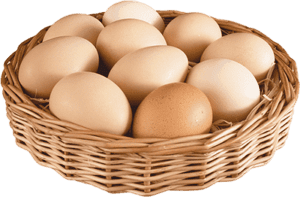
Eggs received immediately from the laying hen contain the maximum benefit in the first week and deteriorate very slowly. Therefore, they should immediately create favorable conditions for storage in order to slow down the rate of aging as much as possible. Fresh product must be kept in the refrigerator in special compartments, which are usually provided in each door of the refrigerator. Cooks advise storing the egg with the sharp end down, referring to the fact that this method helps to preserve its maximum benefit for up to three weeks or more. Later, the healing and taste qualities of the product gradually disappear, but this does not prevent it from being used for making dough and other dishes.
If the product cannot be stored in the cold, then in the hot season, its freshness will help preserve sunflower oil. To prolong the suitability of eggs, they can be lubricated with fatty oil or lard, which form a protective film on the shell. After they are wrapped in newspaper and transferred to an unsealed box or basket, providing air access. But even with this technique, it is better to store eggs in the coldest possible place, which is not accessible to sunlight.




